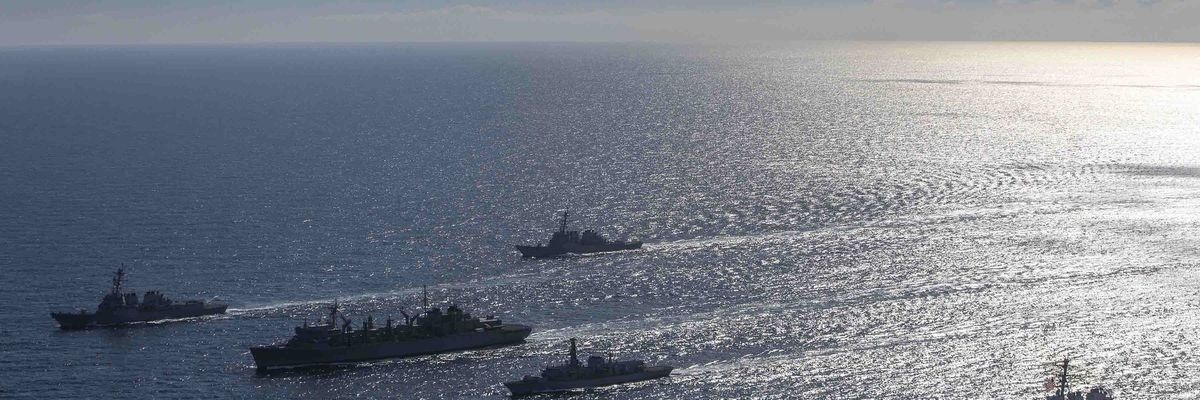Instead of celebrating the meeting on the Elbe to commemorate the seventy-fifth anniversary of the epochal Allied victory over Nazi Germany, the Pentagon opted to overtly deploy a surface action group, in company with the British Royal Navy, into the Barents Sea in an unprecedented gesture of hostility. Against the background of these historical events, not to mention the pandemic, this highly symbolic move that aimed to threaten the very heart of Russian military power, could not have been calculated to be more humiliating or insulting.
Indeed, the deployment of the warships was accompanied by a similarly grand aerial sortie of U.S. strategic bombers to the Baltic, including the first ever American bomber transit of Swedish airspace with apparent escort by the Swedish Air Force. Unfortunately, the planners of that mission likely did not know that Russian strategists have a particularly dark obsession with Sweden going back three centuries. It would be better for all concerned that Stockholm and Moscow not repeat their “Great Northern War.”
Thus, the inclusion of a non-NATO country in the Baltic exercises, which flagrantly brandished nuclear-capable assets, represents yet another significant and destabilizing escalation by the West. The Kremlin seems already to have inaugurated its inevitable set of counter-moves by ordering its pilots to undertake unsafe maneuvers against U.S. Navy aircraft over the Mediterranean last week.
Why should the Russians be so touchy, after all? These are unquestionably international waters that the U.S. Navy has every right to navigate through. Yet, as recently noted by Pavel Devyatkin of the Arctic Institute: Center for Circumpolar Security Studies, “the Barents region was the setting for two invasions of Russia by Western troops,” during the last century.
Illustrating that keen sense of vulnerability, a Russian-language article from the newspaper Nezavisimaya Gazeta, one of Russia’s leading newspapers, made a rather extraordinary assertion last week that Russian naval experts consider: “It is possible that if a real underwater target is discovered in the territorial waters of Russia, the Northern Fleet ships will destroy it.” In other words, both fleets are now again regularly in close proximity and apparently each bracing for a fight too.
Russia’s Northern Fleet is indeed responsible for the major basing of submarines armed with nuclear weapons or “boomers” [SSBNs] — one of the most secure parts of any country’s nuclear deterrent. Thus, the “cat-and-mouse” games that competing navies might play elsewhere on the world’s oceans, for example in the Mediterranean, take on a much more ominous, nuclear strategy connotation when practiced in the waters off of the Kola Peninsula. Indeed, the title of the Russian-language article cited above states crisply, “Northern Fleet hunts for American submarines,” implying that the dangerous Cold War-type maneuvers are intensifying once again.
In the Russian article, a long-time Russian submariner is quoted as saying, “The submarine fleet of the United States and other countries off the coast of Russia is constantly present.” Moreover, the article cites the Russian Navy Commander Nicolai Yevmenov reciting a lengthy list of invigorated aspects of U.S. military activities in Norway, including: upgraded naval facilities at Grotsund for nuclear submarine support, a new radar at Vardo Island, and modernized runways at Bardufoss, Evenes, Banak, Erland and Ryugge.
Meanwhile, the annual U.S. Marine deployment to Norway has also doubled in size, and a squadron of P-8 Poseidon’s also now deploys to Norway at Anneya. Consistent with these observations, a Western report implies that NATO nuclear submarines are visiting Norwegian waters “inshore” three to four times each month.
These military escalations in the High North need more attention, as opposed to the media focus here in the U.S. on tracking Russian trolls, social media influence peddlers, spies, and various “useful idiots.” Even when the New York Times did seemingly take the time last month to try to investigate what might actually be going on under the mysterious waters of the Barents and off the Norwegian coastline, they ended up inexplicably focusing on how such operations might impact Facebook and Twitter, evincing little or no interest at all in the strategic nuclear calculations that constitute the fundamentally ominous basis for both Russian and American operations in these frigid ocean depths.
It’s high time a new generation of American strategists and their reporter friends realize that there is a yawning and highly significant gap separating social media shenanigans from nuclear warfare. Washington needs to “grow up,” and consequently re-prioritize nuclear stability with Russia, rediscovering arms control, crisis management and yes, even strategic restraint and reassurance in the process. Thus, any hint of improving U.S.-Russia relations can only represent some much needed good news, even if the conventional press cannot fathom this.
The opinions expressed in this piece are those of the author alone, and do not reflect any official assessments of the U.S. Government.
















